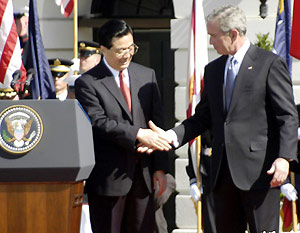| Tools: Save | Print | E-mail | Most Read |
| Call for Joint Efforts to Further China-US Ties |
| Adjust font size: |
Visiting Chinese President Hu Jintao said on Thursday that China and the United States should make joint efforts to advance bilateral constructive and cooperative relations. Hu made the remarks when meeting with US President George W. Bush at the White House. The two leaders exchanged in-depth views on bilateral relations and major international and regional issues of common concern. They reached important consensus during the pragmatic and constructive talks. Speaking highly of the momentum of development bilateral relations were going through, Hu said the important consensus reached between the two heads of state during their meetings last year in New York and Beijing was being implemented. The two countries had made progress in bilateral exchanges and cooperation in various fields and the two sides had maintained effective consultations and coordination on major international and regional issues, noted Hu. He said Sino-US relations had progressed beyond bilateral relationship and have had more and more global influence and strategic significance. China and the United States had extensive and important common strategic interests in, and shouldered common responsibilities for, safeguarding world peace and promoting common development, he said. Hu said China and the United States were not only mutual stake-holders but should also be constructive cooperators, stressing that both sides should make joint efforts to comprehensively advance bilateral constructive and cooperative relations. Bush shared Hu's view on bilateral relations, saying both countries had expanded their areas of cooperation, and China, a great country with remarkably increasing international status, was a key partner in safeguarding world peace and was playing an increasingly important role in that regard. Hu said China and the United States had common strategic interests in opposing and containing "Taiwan independence" and safeguarding peace and stability across the Taiwan Strait. He voiced his appreciation for statements repeatedly made by President Bush and the US government on their adherence to the one-China policy, abidance of the three Sino-US joint communiques and opposition to "Taiwan independence." Hu said China holds that the one-China principle is the basis for maintaining peace and stability across the Taiwan Strait and improving and developing cross-Strait relations. China will, with utmost sincerity and endeavor, strive for a peaceful national reunification and will never tolerate "Taiwan independence," stressed the Chinese president. Bush said the US government's position on the Taiwan question has not changed and the United States would stick to the one-China policy, understands China's concern on the issue and did not want to see unilateral actions taken by the Taiwan authorities in their bid to change the status quo across the strait hurting US-China relations. Both sides agreed that in the current international situation, China and the United States had extensive common strategic interests and broad prospects for reciprocal cooperation. They agreed that a sound bilateral relationship was of strategic significance for safeguarding and promoting peace, stability and prosperity in the Asia-Pacific region and the world at large. They agreed to take bilateral relationship from a strategic height and long-term perspective and comprehensively advance bilateral constructive and cooperative relations in the 21st century so as to benefit the two peoples and other peoples around the world. They agreed to jointly push forward their reciprocal and win-win economic and trade relations, and properly resolve existing differences and frictions through consultations while taking into consideration the fundamental interests of the two countries and their peoples. They also agreed to strengthen exchanges and cooperation in a variety of fields, such as the military, law-enforcement, science and technology, education, culture and youth affairs. They would continue to conduct dialogues and cooperation on major issues such as anti-terrorism, non-proliferation, bird flu control, energy, environmental protection, disaster relief and maintenance of security and stability in the Asia-Pacific region. Both sides would continue to push forward the process of the six-party talks on the nuclear issue on the Korean Peninsula and endeavor to help settle the Iranian nuclear issue diplomatically. The two heads of state met with journalists and answered their questions after their talks. Hu arrived here on Wednesday from the US port city of Seattle to continue his four-day state visit to the United States as Bush's guest. This is Hu's first state visit to the United States and Seattle is the first stop of his US trip. When his visit to the United States ends on Friday, Hu will head for Saudi Arabia, Morocco, Nigeria and Kenya. .
(Xinhua News Agency April 21, 2006) |
| Tools: Save | Print | E-mail | Most Read |
 |
| Related Stories |
| Product Directory China Search |
Country Search Hot Buys |


